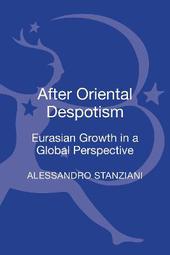
|
After Oriental Despotism: Eurasian Growth in a Global Perspective
Hardback
Main Details
| Title |
After Oriental Despotism: Eurasian Growth in a Global Perspective
|
| Authors and Contributors |
By (author) Alessandro Stanziani
|
| Physical Properties |
| Format:Hardback | | Pages:192 | | Dimensions(mm): Height 234,Width 156 |
|
| Category/Genre | Asian and Middle Eastern history |
|---|
| ISBN/Barcode |
9781472523532
|
| Classifications | Dewey:950.3 |
|---|
| Audience | | Professional & Vocational | |
|---|
|
Publishing Details |
| Publisher |
Bloomsbury Publishing PLC
|
| Imprint |
Bloomsbury Academic
|
| Publication Date |
31 July 2014 |
| Publication Country |
United Kingdom
|
Description
The concepts of economic backwardness, Asiatic despotism and orientalism have strongly influenced perceptions of modernization, democracy and economic growth over the last three centuries. This book provides an original view of Russian and Eurasian history that views both in a global perspective. Via this analysis, Alessandro Stanziani opens new dimensions in the study of state formation, the global slave trade, warfare and European and Asian growth. After Oriental Despotism questions conventional oppositions between Europe and Asia. By revisiting the history of Russia and Eurasia in this context, the book offers a serious challenge to existing ideas about the aims and goals of economic growth. This is an important study that will be of value to students and scholars of global, European and Asian history.
Author Biography
Alessandro Stanziani is Director of Studies at the Ecole des Hautes Etudes en Sciences Sociales, France
ReviewsBy revisiting the history of Russia and Eurasia in the context of global history, Stanziani is successful in breaking a number of our preconceptions. Indispensable for those who are keen to reconsider the conventional narrative and understanding of the history of the world. * Haneda Masashi, Professor of History, University of Tokyo, Japan * After Oriental Despotism is a fascinating and ground-breaking study of human bondage in Russia and Central Asia... This is a pioneering study of Russian serfdom in Eurasian context. * Elise Wirtschafter, Professor of History, California State Polytechnic University, USA * A wide ranging account that links power and the perception of power to the historical dynamics of Eurasian societies from the sixteenth century. Alessandro Stanziani is particularly instructive on labour controls and the related relationship between coercion and economic growth. An important work. * Jeremy Black MBE, Professor of History at the University of Exeter, UK and author of Beyond the Military Revolution: War in the Seventeenth-Century World and War in the Eighteenth-Century World * At a moment when some of the most repressive regimes see the fastest economic growth, it is time to revisit our cherished notions about the connections between freedom and economic development, between democracy and capitalism. To do so, Stanziani disentangles the economic history of Russia during the past few centuries -- usually considered to be exhibit A in any accounts of backwardness--and finds that its economic performance was much better than we have been led to believe and that it succeeded on the back of particularly coercive forms of labor mobilization, and autocratic political institutions. The disconcerting lesson of this path-breaking book is that economic growth can take on many different forms, and be channeled by very different institutions. Freedom, democracy and liberal institutions are neither a precondition for modern economic growth nor an automatic outcome of it. A must read for anyone interested in global economic history. * Sven Beckert, Laird Bell Professor of History, Harvard University, USA and author of Empire of Cotton: The Global Origins of Modern Capitalism (2014) * Balanced assessments and breadth of perspective... [This book] is a significant milestone in the history of Western disputes about the ways of Russian history -- Dmitry Khitrov * Istoricheskij Journal *
|